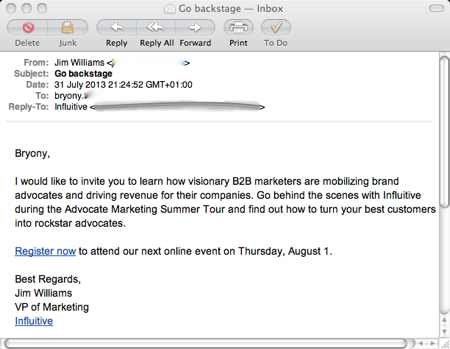Ok, that’s the polite version of the headline. Feel free to make an internal translation on that last word. Because that’s what people do all the time. What you say isn’t always what people hear. They interpret your words with their own experience, bias, knowledge, etc.
This is one of the reasons that so much marketing is such a load of rubbish. It’s rubbish because many marketers seem addicted to speaking rubbish. The more jargon and hideous buzzwords you use, the more people will be forced to make an internal translation of what you’re saying.
Last night I received this email. Now, I know nothing at all about this company. I’ve never subscribed to email from them. It may be brilliant technology. But, sorry Jim, it’s awful marketing of marketing. It’s the first sentence that really gets me.
It’s ironic, seeing as marketers we are meant to be the masters of communication.
Imagine going into a management team meeting and saying something along the lines of…
“We’ve nailed a really great concept, I’m totally loving the big idea, I reckon this campaign will go viral, generating excellent word-of-mouth amongst our advocates. I’m really looking forward to tracking the buzz metrics.”
Those of you who are up to your eyes in the latest ‘marketing thinking’ day-in, day-out might think that sounds great (and many more will roll your eyes in dismay).
But, most business people will have translated this internally, thinking something like…
“You’ve just spent a load of money on some over-hyped marketing twaddle, that will more than likely generate little more than hot air.”
The problem of jargon and complex language isn’t confined to marketing. It’s in any expert discipline or established community. Business disciplines, like IT, law, marketing, finance, operations, human resources, etc. all have their own jargon. It’s worth taking a moment to consider whether the people you’re talking to actually understand a word you’re saying. If not, think again. Find someone outside your area to give you some honest feedback – do your words sound like gobbledygook to them?
Now, the keen-eyed amongst you will quickly see that this website has its fair share of marketing jargon. I like to think I make it digestible, but acknowledge that the plain English campaign would take me aside from time to time (especially on my mixed metaphor habit!).
The point is to at least consider the language your business is using – because what you mean to say is not always what people hear. I’m not completely anti-jargon, I simply advise handling it with care. If you want to earn the right to a person’s precious time, at least do them the courtesy of speaking a language they understand.
And, if you do need a translation of any marketing rubbish, drop me a line and I’ll happily decipher it for you!
Oh, and I think the email is saying that they have technology that finds people who have the ear of your potential buyers, and encourages them to like and recommend your company to them.
© Bryony Thomas | The Watertight Marketer (an adaptation of a post that originally appeared here).

Bryony Thomas
Author & Founder, Watertight Marketing
Bryony Thomas is the creator of the multi-award winning Watertight Marketing methodology, captured in her best-selling book of the same name. She is one of the UK's foremost marketing thinkers, featured by the likes of Forbes, The Guardian, Business Insider and many more, and in-demand speaker for business conferences, in-house sales days and high-level Board strategy days.




It’s so true! As someone who only does marketing because I’m the only one in the company (sole trader) I get that feeling all the time. It boils down to the fact that there’s probably not an original thought there, so it needs dressing up. And I that kind of marketer admitted to themselves they’d talk themselves out if a job!
What I can’t believe is that I can make a good living translating from gobbledy-gook jargon to English as a copywriter.
I wrote this article for a marketing website a while ago. They edited the hell out of it to make it sound more buzzwordy.
http://contentmarketinginstitute.com/2013/05/successful-content-marketing-2023-expert-advice-trends/
Someehow it still managed to go viral.
The reason people use buzzwords and a secret language is to puff up their egos. Most people feel a bit insecure about asking what something means. So if someone starts using the jargon – they sound like they know what they’re talking about to an outsider. And are therefore given promotions in corporate circles.
Hey ho! It just means more work my way.
Thanks Martin, I do think relying on acronyms, etc. usually means people don’t truly understand things in depth – because they can’t describe it in their own words. The ‘how would you explain this to a 12 year old’ test, is a good one.
Yes, Alex the ego-centred secret world thing is definitely true. But, it will only gain you credit with those of a similar ilk. I’ve found that in most sensible businesses, being able to have a clear and comprehensible conversation with non-marketing peers gets you much further.